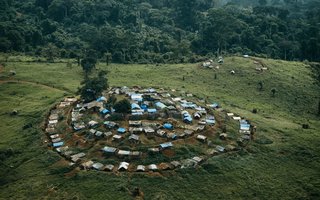15 recommendations to improve atrocity prevention efforts in eastern DRC
In recent years, the Democratic Republic of Congo (DRC) has seen cases of violence against civilians rise. In the absence of government-led efforts to curb the violence, the majority of atrocity prevention activities have been carried out through local and international efforts.

This toolkit was developed from a recently published report ‘Escaping “Perpetual Beginnings”' published by Peace Direct and the Research Initiatives for Social Development.
Download
The research highlighted that violence in eastern DRC is highly complex. Ongoing problems linked to issues of land, identity and power are undermining opportunities for peace.
This toolkit brings together 15 recommendations to support atrocity prevention efforts, aimed at the Congolese Government, MONUSCO, local civil society, and international donors.
Recommendations for the DRC Government
The capacity deficits of the current DRC government, both in terms of its organisations and institutions, has ultimately facilitated an environment that is at grave risk of atrocities. Immediate steps are needed urgently to improve the capacity of state actors and institutions, and build linkages to support atrocity prevention efforts.
National government:
- Strengthen the DRC National Committee for the Prevention and Punishment of the Crime of Genocide, War Crimes, Crimes Against Humanity and All Forms of Discrimination by developing both vertical and horizontal channels for communication, connection, and support.
- Allocate financial, material and human resource support to local government bodies and local civil society organisations to facilitate long-term dialogue activities between all relevant conflict actors.
- Proactively engage with the International Conference on the Great Lakes Region to strengthen regional relationships to learn about successful practices for strengthening state-society relations via a national prevention mechanism.
Local and provincial government:
- Allocate financial, material and human resource support for formal local and provincial prevention mechanisms to strengthen the national prevention mechanism and ensure consistent and coordinated practice across all actors.
Recommendations for MONUSCO
While MONUSCO needs to take steps to address long-standing criticisms of the mission that have undermined their ability to collaborate effectively with civil society, such as issues of low accountability and a lack of flexibility in their approaches; the imminent withdrawal of MONUSCO from several provinces in DRC highlights the need for a robust transition strategy, and a number of vital actions in need of immediate implementation.
- A detailed plan to support the functioning of the DRC’s National Committee for the Prevention and Punishment of the Crime of Genocide, War Crimes, Crimes Against Humanity and All Forms of Discrimination, including direct actions to support links between civil society and DRC government actors such as the national government, the FARDC and the PNC;
- A clear mandate for how Civil Affairs Chiefs and Heads of Office (JHRO) should coordinate with local civil society and local government to ensure systems, knowledge and resources are transferred to those carrying out the majority of atrocity prevention work after the UN’s exit.
Recommendations for civil society:
Civil society currently functions as the primary provider of atrocity prevention and broader violence prevention work; thus, it is essential that civil society actors support the Congolese government to address the root causes of atrocities, and strengthen prevention efforts. This should involve the following actions to:
- Facilitate the development and implementation of local and provincial prevention mechanisms that provide standardised mechanisms for tracking predicting and preventing violence and atrocities. This should include integrating new indicators specifically on identity factors, land issues, and behaviour and perception of public officials and security actors.
- Host recurring dialogue activities and partner with key actors to support the rebuilding of trust between state actors and society.
- Advocate for the Congolese government, regional power holders and international actors to provide technical and financial support for local prevention effort, and conduct further research to better understand the micro-dynamics of conflict in the DRC.
Recommendations for international donors:
To enable and support the Congolese government, MONUSCO and civil society actors to achieve the above, international donors should prioritise the following actions:
- Provide significant increased financial and human resource support to the MONUSCO mission to facilitate a smooth transition over the next 3+ years;
- Provide financial and technical support for civil society and local authorities to establish local and provincial atrocity prevention mechanisms, including direct funding for recurring and locally led dialogue events.
- Provide financial and technical support to local and provincial state actors to establish clarity around the application of land tenure laws; better establish the rule of law and systems of justice.
- Support local atrocity prevention actors to set their own strategic direction, priorities and programmatic focus through the provision of flexible and long-term funding.
- Invest in evidence-based strategic actions that are grounded in locally led research on the relationship between atrocities, complex violence, land conflicts, power relations and politics.
- Be conscious of terminology like ‘atrocity prevention’ and ‘identity-based violence’ and be guided by local actors’ analyses and insights to formulate appropriate responses that do not undermine broader efforts at violence prevention
Read more in ‘Escaping “Perpetual Beginnings”’ available now.
Download full report.
Download Executive Summary.





